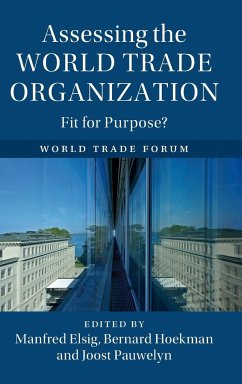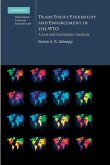Assessing the World Trade Organization
Herausgeber: Elsig, Manfred; Pauwelyn, Joost; Hoekman, Bernard
Assessing the World Trade Organization
Herausgeber: Elsig, Manfred; Pauwelyn, Joost; Hoekman, Bernard
- Gebundenes Buch
- Merkliste
- Auf die Merkliste
- Bewerten Bewerten
- Teilen
- Produkt teilen
- Produkterinnerung
- Produkterinnerung
This book challenges our understanding of the true role and impact of the World Trade Organization.
Andere Kunden interessierten sich auch für
![Applying Benford's Law for Assessing the Validity of Social Science Data Applying Benford's Law for Assessing the Validity of Social Science Data]() Michael A. Long (Oklahoma State University)Applying Benford's Law for Assessing the Validity of Social Science Data35,99 €
Michael A. Long (Oklahoma State University)Applying Benford's Law for Assessing the Validity of Social Science Data35,99 €![Research and Practice in Assessing Academic Reading: The Case of Ielts Research and Practice in Assessing Academic Reading: The Case of Ielts]() Cyril J. WeirResearch and Practice in Assessing Academic Reading: The Case of Ielts102,99 €
Cyril J. WeirResearch and Practice in Assessing Academic Reading: The Case of Ielts102,99 €![Collecting, Managing, and Assessing Data Using Sample Surveys Collecting, Managing, and Assessing Data Using Sample Surveys]() Peter Stopher (University of Sydney)Collecting, Managing, and Assessing Data Using Sample Surveys68,99 €
Peter Stopher (University of Sydney)Collecting, Managing, and Assessing Data Using Sample Surveys68,99 €![Assessing Measurement Invariance for Applied Research Assessing Measurement Invariance for Applied Research]() Craig S. Wells (Amherst University of Massachusetts)Assessing Measurement Invariance for Applied Research46,99 €
Craig S. Wells (Amherst University of Massachusetts)Assessing Measurement Invariance for Applied Research46,99 €![The Willing World The Willing World]() James Bacchus (University of Central Florida)The Willing World41,99 €
James Bacchus (University of Central Florida)The Willing World41,99 €![Trade Policy Flexibility and Enforcement in the Wto Trade Policy Flexibility and Enforcement in the Wto]() Simon A. B. Schropp (G Graduate Institute of International StudiesTrade Policy Flexibility and Enforcement in the Wto50,99 €
Simon A. B. Schropp (G Graduate Institute of International StudiesTrade Policy Flexibility and Enforcement in the Wto50,99 €![Assessing Lawyers' Ethics Assessing Lawyers' Ethics]() Adrian Evans (Victoria Monash University)Assessing Lawyers' Ethics118,99 €
Adrian Evans (Victoria Monash University)Assessing Lawyers' Ethics118,99 €-
-
-
This book challenges our understanding of the true role and impact of the World Trade Organization.
Hinweis: Dieser Artikel kann nur an eine deutsche Lieferadresse ausgeliefert werden.
Hinweis: Dieser Artikel kann nur an eine deutsche Lieferadresse ausgeliefert werden.
Produktdetails
- Produktdetails
- Verlag: Cambridge University Press
- Seitenzahl: 468
- Erscheinungstermin: 31. März 2017
- Englisch
- Abmessung: 235mm x 157mm x 30mm
- Gewicht: 808g
- ISBN-13: 9781107193222
- ISBN-10: 1107193222
- Artikelnr.: 47722329
- Herstellerkennzeichnung
- Libri GmbH
- Europaallee 1
- 36244 Bad Hersfeld
- gpsr@libri.de
- Verlag: Cambridge University Press
- Seitenzahl: 468
- Erscheinungstermin: 31. März 2017
- Englisch
- Abmessung: 235mm x 157mm x 30mm
- Gewicht: 808g
- ISBN-13: 9781107193222
- ISBN-10: 1107193222
- Artikelnr.: 47722329
- Herstellerkennzeichnung
- Libri GmbH
- Europaallee 1
- 36244 Bad Hersfeld
- gpsr@libri.de
Part I. Introduction and Setting the Stage: 1. Introduction Manfred Elsig,
Bernard Hoekman and Joost Pauwelyn; 2. Thinking about the performance of
the World Trade Organization: a discussion across disciplines Manfred
Elsig, Bernard Hoekman and Joost Pauwelyn; Part II. New Insight from the
Early Times: 3. The GATT's starting point: tariff levels circa 1947 Chad P.
Bown and Douglas A. Irwin; 4. Negotiating in the early GATT: norms, rules
and the US tariff schedule Judith Goldstein and Robert Gulotty; Part III.
General Trends and Patterns in WTO Dispute Settlement: 5. Dispute
settlement in the WTO: from a deliberately designed to a spontaneously
grown order Frieder Rössler; 6. About the melting of icebergs: political
and economic determinants of dispute initiation and resolution in the WTO
Dirk de Bièvre, Arlo Poletti and Aydin Yildirim; 7. The WTO dispute
settlement system: consolidating success and confronting new challenges
Giorgio Sacerdoti; 8. Does trade comply? The economic effect(iveness) of
the WTO dispute settlement process Soo Yeon Kim and Tobias Hofmann; Part
IV. Zooming in on Specific Debates: 9. Twenty years of third party
participation at the WTO: what have we learned? Krzysztof J. Pelc; 10. Mind
the gap: navigating between the WTO agreement and its accession protocols
Julia Qin; 11. The age of innocence - the evolution of the case-law of the
WTO dispute settlement: subsidies as a case-study Luca Rubini; 12. The
presence of the World Trade Organization within preferential trade
agreements Todd Allee and Manfred Elsig; 13. The WTO and regional trading
agreements: is it all over for multilateralism? L. Alan Winters; 14.
Performance and international organisations' borders: the case of the World
Trade Organization Cèdric Dupont and Manfred Elsig; 15. The GATT/WTO system
and national trade policies: which comes first? Joseph Michael Finger.
Bernard Hoekman and Joost Pauwelyn; 2. Thinking about the performance of
the World Trade Organization: a discussion across disciplines Manfred
Elsig, Bernard Hoekman and Joost Pauwelyn; Part II. New Insight from the
Early Times: 3. The GATT's starting point: tariff levels circa 1947 Chad P.
Bown and Douglas A. Irwin; 4. Negotiating in the early GATT: norms, rules
and the US tariff schedule Judith Goldstein and Robert Gulotty; Part III.
General Trends and Patterns in WTO Dispute Settlement: 5. Dispute
settlement in the WTO: from a deliberately designed to a spontaneously
grown order Frieder Rössler; 6. About the melting of icebergs: political
and economic determinants of dispute initiation and resolution in the WTO
Dirk de Bièvre, Arlo Poletti and Aydin Yildirim; 7. The WTO dispute
settlement system: consolidating success and confronting new challenges
Giorgio Sacerdoti; 8. Does trade comply? The economic effect(iveness) of
the WTO dispute settlement process Soo Yeon Kim and Tobias Hofmann; Part
IV. Zooming in on Specific Debates: 9. Twenty years of third party
participation at the WTO: what have we learned? Krzysztof J. Pelc; 10. Mind
the gap: navigating between the WTO agreement and its accession protocols
Julia Qin; 11. The age of innocence - the evolution of the case-law of the
WTO dispute settlement: subsidies as a case-study Luca Rubini; 12. The
presence of the World Trade Organization within preferential trade
agreements Todd Allee and Manfred Elsig; 13. The WTO and regional trading
agreements: is it all over for multilateralism? L. Alan Winters; 14.
Performance and international organisations' borders: the case of the World
Trade Organization Cèdric Dupont and Manfred Elsig; 15. The GATT/WTO system
and national trade policies: which comes first? Joseph Michael Finger.
Part I. Introduction and Setting the Stage: 1. Introduction Manfred Elsig,
Bernard Hoekman and Joost Pauwelyn; 2. Thinking about the performance of
the World Trade Organization: a discussion across disciplines Manfred
Elsig, Bernard Hoekman and Joost Pauwelyn; Part II. New Insight from the
Early Times: 3. The GATT's starting point: tariff levels circa 1947 Chad P.
Bown and Douglas A. Irwin; 4. Negotiating in the early GATT: norms, rules
and the US tariff schedule Judith Goldstein and Robert Gulotty; Part III.
General Trends and Patterns in WTO Dispute Settlement: 5. Dispute
settlement in the WTO: from a deliberately designed to a spontaneously
grown order Frieder Rössler; 6. About the melting of icebergs: political
and economic determinants of dispute initiation and resolution in the WTO
Dirk de Bièvre, Arlo Poletti and Aydin Yildirim; 7. The WTO dispute
settlement system: consolidating success and confronting new challenges
Giorgio Sacerdoti; 8. Does trade comply? The economic effect(iveness) of
the WTO dispute settlement process Soo Yeon Kim and Tobias Hofmann; Part
IV. Zooming in on Specific Debates: 9. Twenty years of third party
participation at the WTO: what have we learned? Krzysztof J. Pelc; 10. Mind
the gap: navigating between the WTO agreement and its accession protocols
Julia Qin; 11. The age of innocence - the evolution of the case-law of the
WTO dispute settlement: subsidies as a case-study Luca Rubini; 12. The
presence of the World Trade Organization within preferential trade
agreements Todd Allee and Manfred Elsig; 13. The WTO and regional trading
agreements: is it all over for multilateralism? L. Alan Winters; 14.
Performance and international organisations' borders: the case of the World
Trade Organization Cèdric Dupont and Manfred Elsig; 15. The GATT/WTO system
and national trade policies: which comes first? Joseph Michael Finger.
Bernard Hoekman and Joost Pauwelyn; 2. Thinking about the performance of
the World Trade Organization: a discussion across disciplines Manfred
Elsig, Bernard Hoekman and Joost Pauwelyn; Part II. New Insight from the
Early Times: 3. The GATT's starting point: tariff levels circa 1947 Chad P.
Bown and Douglas A. Irwin; 4. Negotiating in the early GATT: norms, rules
and the US tariff schedule Judith Goldstein and Robert Gulotty; Part III.
General Trends and Patterns in WTO Dispute Settlement: 5. Dispute
settlement in the WTO: from a deliberately designed to a spontaneously
grown order Frieder Rössler; 6. About the melting of icebergs: political
and economic determinants of dispute initiation and resolution in the WTO
Dirk de Bièvre, Arlo Poletti and Aydin Yildirim; 7. The WTO dispute
settlement system: consolidating success and confronting new challenges
Giorgio Sacerdoti; 8. Does trade comply? The economic effect(iveness) of
the WTO dispute settlement process Soo Yeon Kim and Tobias Hofmann; Part
IV. Zooming in on Specific Debates: 9. Twenty years of third party
participation at the WTO: what have we learned? Krzysztof J. Pelc; 10. Mind
the gap: navigating between the WTO agreement and its accession protocols
Julia Qin; 11. The age of innocence - the evolution of the case-law of the
WTO dispute settlement: subsidies as a case-study Luca Rubini; 12. The
presence of the World Trade Organization within preferential trade
agreements Todd Allee and Manfred Elsig; 13. The WTO and regional trading
agreements: is it all over for multilateralism? L. Alan Winters; 14.
Performance and international organisations' borders: the case of the World
Trade Organization Cèdric Dupont and Manfred Elsig; 15. The GATT/WTO system
and national trade policies: which comes first? Joseph Michael Finger.








